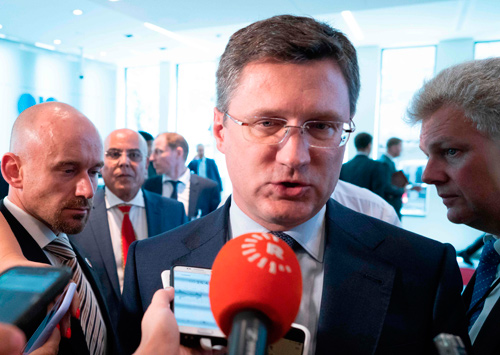VIENNA — The OPEC bloc of oil producers on Tuesday formally signed a new charter of cooperation with major allies, including Russia, one day after thrashing out the document at a marathon meeting.
The new agreement between OPEC and its so-called OPEC+ partners is being seen as a sign of the cartel’s efforts to stay relevant in a market which has been transformed by booming US shale oil output.
Saudi Oil Minister Khalid Al Falih hailed this week’s meeting as “historic” and said that “market volatility” meant that a new framework was needed with “more producer power than OPEC alone can provide”.
OPEC Secretary General Mohammed Barkindo compared the new partnership to a marriage, telling reporters: “It’s for eternity!”
“We’re confident that with the course of time, probably by next time we meet, we may have some new members joining the charter,” Barkindo said.
Russian Energy Minister Alexander Novak declared on Monday that all of OPEC’s ministers had agreed to prolong its daily production cuts.
Speaking through an interpreter after Tuesday’s meeting, Novak said that the new cooperation accord between OPEC and its allies was not only the result of growing US output.
“We do not shape our strategy in response to US actions; we shape our actions in response to what the market does,” Novak said.
‘Unjustified’ sanctions
The production cuts signed off on this week by OPEC and its allies had been agreed by Russia and OPEC kingpin Saudi Arabia at the G-20 summit in Osaka last weekend.
OPEC+ comprises the cartel’s 14 member nations plus 10 extra crude producers: Russia, Mexico, Kazakhstan, Azerbaijan, Bahrain, Brunei, Malaysia, Oman, Sudan and South Sudan.
Monday’s gathering of OPEC ministers ran almost five hours late into the evening as ministers discussed the details of the new charter.
Iran was more sceptical of the idea and its Oil Minister Bijan Namdar Zanganeh said on leaving the meeting that the charter would have “no impact on OPEC and its mechanism or decision taking”.
Also speaking late on Monday, Saudi Energy Minister Khalid Al Falih said the charter would allow OPEC and non-OPEC countries to establish “a structure for technical meetings, ministry meetings, regular summits” with the OPEC secretariat in Vienna acting as “the main coordinator”.
While Monday’s agreement in Vienna had initially sent oil prices surging, on Tuesday they were more subdued amid fresh worries over the global economic outlook.
Novak said on Tuesday that in his view oil market volatility was being worsened by “trade wars which are intensifying as we speak”.
“We see sanctions being used freely without any justification and more and more frequently,” Novak added.
